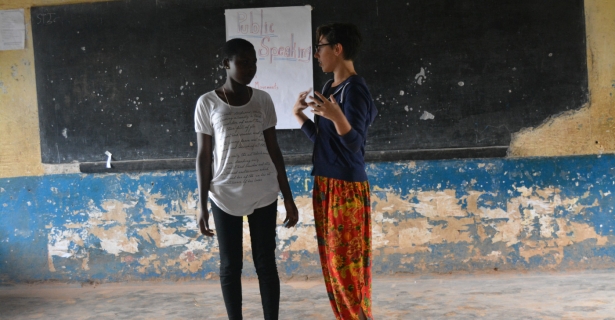Hannah Freedman is in the class of 2017, interning with the African Youth Leadership Experience in Kampala, Uganda. She is an Empower fellow.
One of the biggest challenges we designed for the AYLE students occurred on Day Four: Gender Day. On Gender Day, the boys and girls said goodbye to each other after breakfast and split up for separate activities. I was asked to help facilitate the girls’ session, aptly named Phenomenal Women, with Maria, a creative writing facilitator, and Grace, a dance and movement facilitator. Talking about feminism with girls is one of my favorite things, and after planning the day with Maria and Grace I grew even more excited. We started the morning off by presenting the girls with two silhouettes of people, one of a man and one of a woman. We asked them to write in the figures all of the stereotypes of each gender with markers and then read them out. Mary Joseph, a quiet girl from Tanzania, pointed out the difference between the word “boss” on the male figure and the word “controlling” on the female figure. I sat back, impressed, and watched the girls respond.
We were seated at tables outside. A little ways away, in the kitchen area, the boys had started their morning by washing the community’s breakfast dishes and helping the kitchen staff peel plantains for the matoke we would eat for lunch. For many of them, this was their first time attempting either chore. At first, the girls had giggled and watched them, but when the conversation started up, they forgot the boys completely and dove in.
The discussion shifted to ideas about what makes an “ideal” woman, and for the next activity, each participant made a list of the women in their life that they admire and the specific qualities that they admire about them. Throughout the day, we danced, we sang songs, we talked about our mothers, and we discussed challenges that women face. It was a wonderful day- there is something that shifts in communication in a group of all women- and we shared and learned.
There were several times throughout the day, however, when I noticed a wide cultural disconnect; my opinions as a white American feminist became no longer contextually valid. As we were talking about challenges that women face, Esperance, from Kenya, brought up what people think and say when she wears short skirts.
“I should be able to wear what I want without caring what people think,” she said. Four or five girls immediately responded to her opinion, talking about respect, tradition, and cultural norms. I agreed with Esperance, but as a facilitator, it was not my place to add in my own opinion.
I also became tense when the conversation shifted to rape and sexual assault. Fresh from a campus that had had many conversations about sexual assault this year, it was hard to hear women say, “Well, no, sometimes it is the girl’s fault.” I was upset and angry and stepped out of the conversation to collect myself. Outside, I found myself thinking of my own opinions as more progressive than the other women’s, more advanced and civilized. Thoughts like these are extremely problematic in the larger context and history of Western physical and cultural imperialism in East Africa. It was not my responsibility, place, or right to teach my opinions. This conversation was not about or for me; it was not an invitation to share. It was twenty women from Uganda, Kenya, and Tanzania figuring out how they thought and felt feminism applied to them and their identities as women at a cultural intersection.
After lunch, Maria led us in a creative writing exercise: she read Maya Angelou’s poem “Phenomenal Woman” and everyone spread out to write their own poem. After half an hour, we reconvened and copied our poems onto a phenomenal life-sized silhouette of a woman. The poems were joyful and proud, and as the day drew to a close and it was time to meet with the boys again, Grace led us all in a song she learned in the Congo, a song that celebrates femininity and empowerment.
“Singamana loketo! Singamana mokongowe. Singamana loketo! Singamana loketo mabele mangondoma kabitoto.” We sang and marched our way back into the group, announcing ourselves as Phenomenal Women.


Add new comment